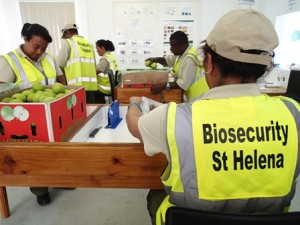
As a remote oceanic island, St Helena Island is very vulnerable to the introduction of new pests, weeds and diseases which can adversely affect agricultural production, the natural environment, and also human and animal health. Protection against harmful introductions is given by the biosecurity service, Biosecurity St Helena. Our national Biosecurity Policy was approved in November 2014
Alerts
Help us to stop the spread of new pests by checking these alerts:
The Biosecurity Major Incident Plan can be found here, outlining emergency response plans for both zoosanitary and phytosanitary risks.
What can I bring into St Helena?
Here you can find biosecurity information for visitors to the Island, new residents, visiting yachts, researchers working in protected areas, and importers and exporters of risk goods:
- Biosecurity For Visitors to St Helena Air
- New residents in St Helena
- Heading for St Helena : essential information for visiting yachts
- Animal imports from South Africa
- The problem with honey
Click here for full details of our import health standards
Click here for application forms for import and export licences
What can I do to help?
Check out what you can import before you order, in the section above or contact the Biosecurity Officer julie.balchin@enrd.gov.sh
Pests and weeds can sneak in by stowing away, hitchiking or being smuggled. Keep your eyes open! If you see something new or unusual – insect, weed, footprints – in your garden, at work or out hiking, report what youv’e seen or found to ANRD Scotland, on 24724, or hand it in to Environment, Tourism or the National Trust.
- Field trip protocol for researchers
- Stop the Spread
- Biosecurity protocol for the marine environment
- Haul out procedures for visiting yachts
Other Information
A database of invertebrate pests and biological control agents is available here
Watch our new Border Security Movie Clip here
The Convention on International Trade in Endangered Species
The movement of shells, feathers, plants and plant products of some species is regulated under the Convention on International Trade in Endangered Species of wild Fauna and Flora (CITES), of which St Helena is a signatory. Application for import or export of species identified in Appendices I, II or III must be accompanied by a valid CITES export permit issued by the appropriate management authority in the country of export, unless covered by exemptions as specified in Article VII. Additional information can be obtained at: http://www.cites.org for details.